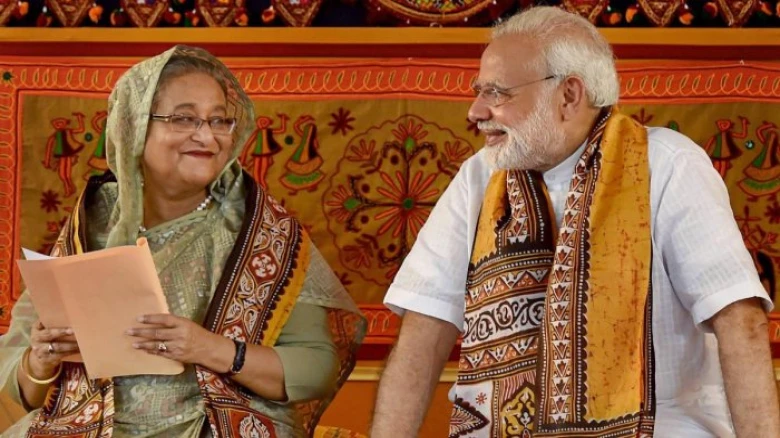Regional

Digital Desk: When Sheikh Hasina, the prime minister of Bangladesh, comes
to India for a three-day visit in the first week of September, it is
anticipated that they will jointly launch the 1320 MegaWatt Maitree Super Thermal
Power Station. The coal-fired station, which is being built by Bangladesh India
Friendship Power Company Limited, a 50:50 joint venture between India's NTPC
and Bangladesh Power Development Board, is being billed as Bangladesh's biggest
power plant. The project has a 1.5 billion USD price tag.
The Modi
administration has given the visit top priority because Dhaka is one of India's
closest friends. Bangladesh PM Hasina is expected to visit India at any time
between September 5 and 7 and stay for two to three days. Trial runs between
the Indian ports of Kolkata, Chattogram, and Mongla before PM Hasina visits in
Delhi A new chapter in the bilateral relations will be started through trade
with Bangladesh.
The first ship from
Kolkata is anticipated to arrive at Mongla on the Pashur River on August 5 with
containers containing 16 tonnes of iron pipes for Meghalaya and 8.5 tonnes of
pre-foam for Assam, respectively, utilising the Tamabil-Dwaki border points.
Through this endeavour, India would be able to access its North-East region on
less expensive and other routes while also transporting export-import
containers for Bangladesh.
As a strong ally of
India, the Modi administration has also permitted the export of desperately
needed wheat to Bangladesh through the Hili Land Port in Dinajpur. As a result,
the price of wheat has decreased, allaying Dhaka's concerns about inflation.
Bangladesh receives around 66% of its wheat from India, while the war with
Russia has negatively impacted 15% of Bangladesh's annual imports from Ukraine.
Even though Bangladesh
has applied for a loan from the IMF, Sheikh Hasina's administration is making
progress on the economy and infrastructure development, and Bangladesh is on
track to grow by more than 6% this fiscal year. The hardening of the USD has
affected Dhaka, along with every other nation on the Indian subcontinent,
making exports more expensive. However, compared to the Pakistani and Sri
Lankan rupees, the Bangladeshi Taka is holding its own versus the US dollar.
While Bangladesh has
developed under Sheikh Hasina's leadership, Islamic radicalism has increased,
with Muslim Brotherhood branch Jamait-e-Islami playing a significant role in
border regions. Even though the Supreme Court ruled in 2013 that Jamaat was
ineligible to run for office, the organisation, together with other radicalised
groups like Hefazat-e-Islam, Jamait-ul-Mujahideen, and Islamic Chhatra Shibir,
play a key role in planning assaults against Hindu minorities in Bangladesh.
To add fuel to fire are the Rohingya
immigrants who have been penetrated by Pakistan based terrorist groups like
Lashkar-e-Toiba to create problems for the ruling Awami League party. While
Sheikh Hasina will take care of Bangladesh’s economy, it is the radical
Islamists who could dent her prospects in the election next year unless made
accountable by the law enforcement agencies.
Leave A Comment